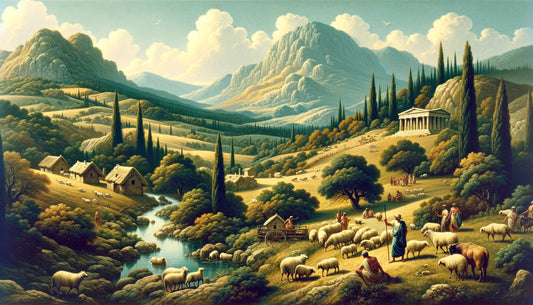
Mastering the Chase: Hercules' Strategic Conquest of the Erymanthian Boar
It complements the story of the Erymanthian Boar.
"Appearances can be deceiving." You've probably heard this phrase thousands of times in your life. But have you ever suffered its consequences?
The situation can be surprising, amusing, or infuriating when experienced from the outside. We often see examples in sports competitions: the favourite team to win a match loses inexplicably. "They got complacent" or "that's the game" are common reactions. However, when you experience it firsthand, frustration and anger can take over.
Hercules' fourth labour was one of those deceptive tasks. While it is true that Hercules never showed overt confidence and that the outcome was ultimately favourable to the hero, the effort he devoted and the events he had to endure before achieving the feat were entirely undesirable.
How was the feat accomplished? What mistakes were made and could have been avoided? What can be learned from the story? Let's find out!
Friendship and Diversity of Opinions
The story of the Lernaean Hydra introduces the concept of synergy to achieve victory in the confrontation. On this occasion, there isn’t an explicit collaboration in the hunt, but help arrives differently. It is not until Pholus enlightens Hercules with the strategy to follow in the hunt that he decides to change his plans. In other words, Pholus guides Hercules to victory.
From this gesture, two great lessons are derived. The first is the value of friendship. Pholus and Hercules are old friends, and the centaur hosts him at his home. In this way, the hero can enjoy good rest, food, and company while preparing to resume his task—a vital help at a complicated time, accentuated by the arrival of winter.
The second is the advice received from his friend. One of the greatest treasures we possess is the privilege of being able to seek advice from our friends. And the closer the friendship, the more we listen, because we know that those evaluations and opinions are there to help us in any difficult situation we may encounter.
The diversity of opinions is so valuable that it is found in all economic and social environments. The diversity of thinking minds does not have an additive effect but a multiplicative one, and it is the foundation of humanity’s greatest successes.
Understanding the Environment
Pholus had no doubt that his idea would lead Hercules to success. That area was his home: he knew the forest, the surroundings, and could anticipate when to do each thing.
Understanding the environment is one of the secrets that has led humans—and some animals—to survive and become masters of an area. Today, we find examples of this assertion not only in the natural world but also in large cities. Whether it's foraging for mushrooms in the forest, driving a car knowing where the speed cameras are, or avoiding certain neighborhoods and streets to dodge crime.
So much so that the millennia-old work "The Art of War" by Sun-Tzu dedicates two chapters to the theme of territory. In this case, it's not about a hand-to-hand battle but a capture and escape dispute between the boar and Hercules. The boar is on its ground, referred to as dispersal ground in the text. “On dispersal ground, avoid battle,” it reads. As expected, Hercules does not succeed in capturing the boar no matter how hard he tries.
It is not until the weather conditions change that an opportunity presents itself. Due to the accumulation of snow, the terrain becomes difficult. At this moment, then, he can go on the offensive, as the boar loses the advantage it enjoyed.
Not Losing Sight of the Consequences
The dark episode at the cave tavern leaves us with the final lesson of the story: a situation Hercules would like to forget, as he is largely responsible for it. Because if you've never had a scare or incident when alcohol was involved, consider yourself fortunate.
The dinner night is a joyful moment for Hercules. He has a strategy in mind to complete his task and will soon be able to resume his journey back to Mycenae. When he hears about the great jar of wine from Dionysus, he cannot resist the temptation to try it. Pholus, cautious and aware of the effect that opening the jar can cause, tries to dissuade Hercules. Nevertheless, faced with his guest's insistence, he cannot deny him the pleasure.
Although they only have a small taste of the wine, its potency sends them into a state of ecstasy. Thus, everything that happens afterward is only possible when sanity is lost. From euphoria, they move to aggression, and this ends with a series of deaths in the cave. The combination of the centaurs' temperament and the two friends' behaviour under the influence of wine has fatal consequences.
It is crucial to always keep one's bearings and be very cautious when in an altered state of consciousness. Let this state not blind you to the possible consequences of your decisions and actions. Otherwise, the cost can be very high.


